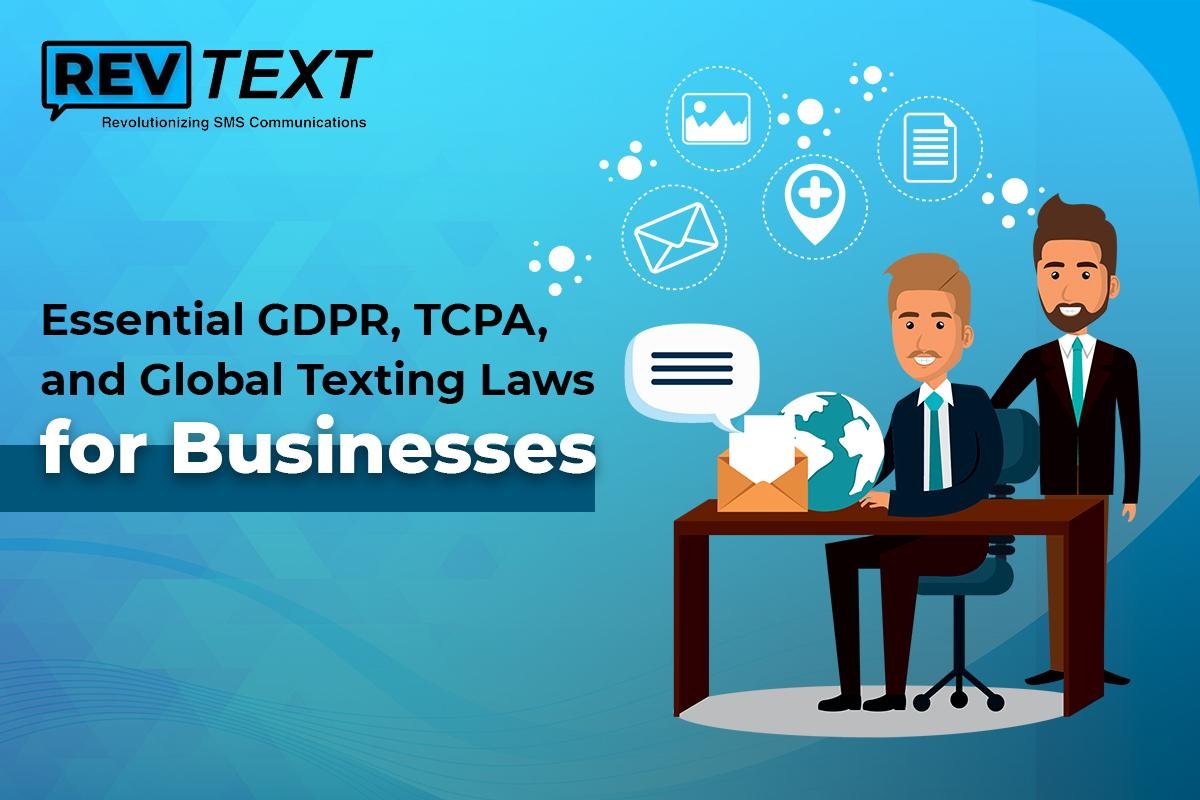Legal Disclaimer: The information provided in this blog post is for general informational purposes only and is not intended to serve as legal advice. While we strive to provide accurate and up-to-date information regarding GDPR, TCPA, and FCC compliance, laws and regulations may vary by jurisdiction and change over time.
You should consult with a qualified attorney or compliance expert to ensure your specific practices meet all legal and regulatory requirements. RevText assumes no responsibility or liability for any errors, omissions, or outcomes related to your use of this information. Use this content at your own discretion.
Business texting platforms have brought notable changes in terms of customer communications. From sending timely reminders to crafting compelling SMS marketing campaigns, texting has become a powerful tool for boosting customer engagement. But with this power, it is important to know about the legal landscape as well. Understanding and adhering to SMS marketing laws isn’t just about avoiding penalties—it’s about earning customer trust and maintaining your brand’s reputation. This guide dives deep into SMS compliance, legal requirements, and best practices helping you craft impactful messages while staying firmly on the right side of the law.
Why is SMS Compliance Important?
SMS compliance is not just about adhering to regulations; it’s about respecting consumer preferences, safeguarding their data, and building a trustworthy brand. For example, a logistics company must ensure that all promotional messages include clear opt-out instructions and are sent only to recipients with prior express consent. Industries such as banking and financial services must also prioritize compliance to maintain credibility and avoid legal repercussions.
Key Regulatory Frameworks Governing SMS Compliance
Several regulations govern the use of business texting platforms for marketing purposes. Let’s explore the three primary frameworks:
GDPR
The General Data Protection Regulation (GDPR) stands as one of the toughest data protection frameworks in the world which every business and business texting platform should know about.
Non-compliance can lead to steep penalties for the business texting platforms—whichever is greater: 20 million Euros or 4% of a company’s global annual revenue. With its stringent guidelines, the GDPR focuses on three key principles: obtaining consumer consent, providing clear opt-out options, and ensuring secure data management.
Consumer Consent: Before reaching out to any individual through calls, emails, or texts, businesses must secure explicit permission—ideally in writing—to respect consumer autonomy.
Opt-Out Options: Every message or communication must give recipients an easy way to unsubscribe, such as links or simple keywords to opt-out.
Customer Data Management: Sharing consumer data with third parties is strictly prohibited unless the customer explicitly agrees. While encryption isn’t mandated, it’s a recommended safeguard, as companies may face consequences if a data breach occurs and they’ve failed to implement adequate protections.
For businesses operating in the U.K., additional regulations like the Data Protection Act (DPA) and Privacy and Electronic Communications Regulations (PECR) must also be considered to remain compliant and protect consumer trust.
TCPA
The Telephone Consumer Protection Act (TCPA), enforced by the Federal Communications Commission (FCC), regulates telecommunications in the United States, including phone, television, and radio communications. This act allows for class action lawsuits, enabling businesses to face significant penalties for repeated violations affecting multiple consumers.
A key aspect of the TCPA is obtaining explicit consent from customers before initiating any contact, similar to the principles of GDPR. The TCPA primarily governs communications via SMS, phone calls, and emails. It also mandates businesses to disclose the use of automated systems when reaching out to customers. Transparency in the consent process is crucial, and the use of automation must be clearly communicated during consent collection.
CTIA
The Cellular Telecommunications Industry Association (CTIA) gives guidance for businesses using SMS marketing campaigns. The CTIA comprises major mobile carriers in the U.S. and creates a list of best practices for the SMS marketing industry. The main aim of this rule is to keep consumers protected from unwanted messages.
Best Practices for SMS Compliance
Adopting best practices ensures compliance while enhancing the effectiveness of your SMS marketing campaigns.
Get a written consent
Secure written consent through methods such as online forms or keyword-based opt-ins. Keep detailed records to safeguard against legal challenges.
Give Disclosure Deals
Your initial opt-in message should include:
- Your organization’s name.
- Purpose of communication.
- Message frequency.
- Message and data rate disclosures.
- Terms and conditions or a link to them.
- Opt-out instructions.
Confirm Opt-In and Notify of Terms Changes
Reconfirm the opt-in with a follow-up message and update subscribers about any changes to terms and conditions.
Time Communications Appropriately
Under the TCPA, businesses cannot text consumers before 8:00 AM or after 9:00 PM in the recipient’s local time zone.
Include the Brand Name in Every Message
Transparency matters for every business texting platform. trust. Always include your company’s name to ensure recipients know who is contacting them.
Avoid Prohibited Content
Adhere to the CTIA’s SHAFT rule and avoid controversial topics unless explicitly permitted (e.g., restaurant promotions for happy hours).
Offer an Easy Opt-Out Mechanism
Ensure consumers can unsubscribe easily by including opt-out instructions in every message. Implementing a “STOP” keyword for unsubscribing is a standard practice.
Building Trust Through Compliance
When businesses use SMS communication tools responsibly, they enhance consumer trust and loyalty. Compliance not only avoids fines but also showcases your commitment to respecting consumer preferences and data privacy.
By understanding the nuances of TCPA, CTIA, and GDPR, businesses can harness the full potential of business texting platforms while adhering to global regulations. From setting up text message reminders to executing targeted SMS marketing campaigns, staying compliant ensures your business thrives in today’s competitive landscape.
Final Thoughts
Incorporating compliance into your SMS strategies is non-negotiable. Use this guide to align your practices with legal standards and build a foundation of trust with your audience. To safeguard your business using these SMS compliance strategies, deal with RevText, This business texting platform adheres to all the regulations and can stand out from its competitors giving a sense of security to its customers.



